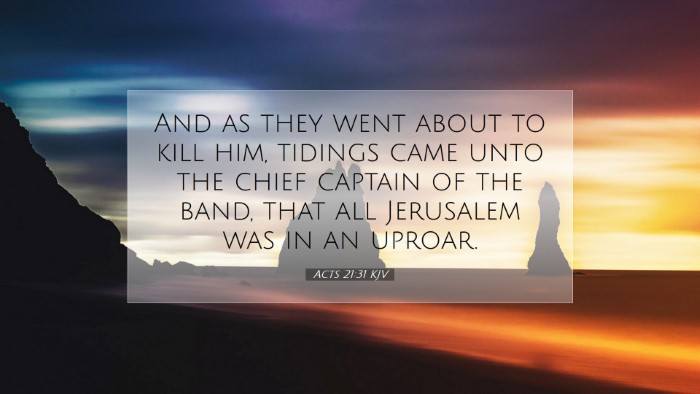Commentary on Acts 21:31
Verse: "And as they went about to kill him, tidings came unto the chief captain of the band, that all Jerusalem was in an uproar."
Introduction
The verse under consideration, Acts 21:31, depicts a critical moment in the early Christian church, highlighting the intense persecution faced by Paul. This commentary will incorporate insights from notable public domain commentaries, including those of Matthew Henry, Albert Barnes, and Adam Clarke, to provide a thorough exploration of the text for pastors, students, theologians, and biblical scholars.
Context and Background
Acts 21 recounts the events following Paul's arrival in Jerusalem, where he faces prejudice and hostility from the Jewish community. A powerful element of this narrative is the growing tension between Christians and traditional Jewish authorities. The preceding verses establish the circumstances leading to Paul being accused and nearly killed by an enraged mob.
Matthew Henry's Commentary
Matthew Henry emphasizes the fervent opposition faced by Paul and notes that this reflects the greater spiritual conflict of the era. Henry states that the uproar was largely fueled by misunderstanding and prejudice against the Gospel message. He underscores the irony of Paul, a former persecutor of Christians, now being persecuted for preaching the very faith he had once sought to destroy.
Significance of the Uproar
Henry points out that the uproar mentioned was not just a local issue but indicated a significant unrest within the city of Jerusalem. It symbolizes the broader rejection of Christ and His teachings by significant segments of the Jewish populace. This moment illustrates the dangerous environment Paul navigated and the high stakes involved in his mission.
Albert Barnes' Commentary
Albert Barnes further elaborates on the societal dynamics at play. He notes that the announcement of the uproar reached the chief captain, emphasizing the rapidity with which news traveled in the ancient world. Barnes highlights that this captain, likely a Roman official, represents the civil authority’s involvement in quelling the disturbances arising from religious conflict. His intervention signifies an important shift, where the Roman authorities become protective of Paul, indicating the political implications of religious dissent.
Message of Divine Protection
Barnes points out the providential hand of God at work in this chaotic situation. The arrival of the captain is seen as a divine intervention to safeguard Paul, allowing the Gospel's message to continue unimpeded. This reflects the belief that God directs the affairs of men, especially to fulfill His purposes.
Adam Clarke's Commentary
Adam Clarke provides a detailed examination of the text, noting the specific conditions under which Paul finds himself. He describes the fury of the mob as particularly fierce, driven by a combination of zeal and misinterpretation of Paul's actions. Clarke illustrates the gravity of the mob mentality and its potential for violence, showcasing how public opinion can quickly escalate into mob violence.
Implications for Early Christians
Clarke emphasizes the implications for early Christians, who would need to navigate similar environments of hostility. Their faith was often tested amidst societal backlash, and Acts 21:31 serves as a potent reminder of the challenges faced by the early church. This verse invites reflection on the reciprocal relationship between belief and societal acceptance.
Theological Insights
Acts 21:31 not only recounts a historical event but also encapsulates key theological insights pertinent to the Christian faith.
The Theme of Suffering for Righteousness
Throughout the New Testament, the theme of suffering for righteousness is prominent. Paul exemplifies this suffering, having endured much for the sake of the Gospel. The verse reflects the broader Christian experience in a world often hostile to the truth of Christ. This principle remains essential for modern readers, serving as a reminder of the potential repercussions of living out one’s faith openly.
God’s Sovereignty in Turmoil
The account in Acts shows God's sovereignty amidst chaos. While adversities arise, they serve divine purposes. It encourages believers that even in tumultuous circumstances, God is orchestrating His plans. The involvement of the Roman captain symbolizes God's protection over His messengers, reinforcing the belief that He can use secular authorities to fulfill His divine will.
Practical Applications
For contemporary believers, Acts 21:31 encourages a deeper understanding of the cost of discipleship. The teachings derived from this verse can inform preaching, teaching, and personal faith practices in several ways:
- Understanding Persecution: Believers today may face misunderstandings or opposition for their faith. This verse serves as a reminder to remain steadfast in their convictions and trust in God's providential care.
- Faith Amidst Turmoil: The realization that God is sovereign, even in chaotic situations, can provide strength and courage to persevere through trials.
- Community and Misunderstanding: It invites careful consideration of how communities perceive the Church and encourages dialogue to dispel misconceptions about faith and motives.
Conclusion
Acts 21:31 is an impactful verse that portrays the struggles faced by Paul amidst societal upheaval. Insights from Matthew Henry, Albert Barnes, and Adam Clarke enrich our understanding of this passage, revealing its significance in the life of the early church and its implications for today's believers. As we reflect on this verse, may we be encouraged by the example of Paul—the courage to stand firm in the truth of the Gospel, regardless of the cost, and the assurance of God's sovereign hand at work in our lives.


